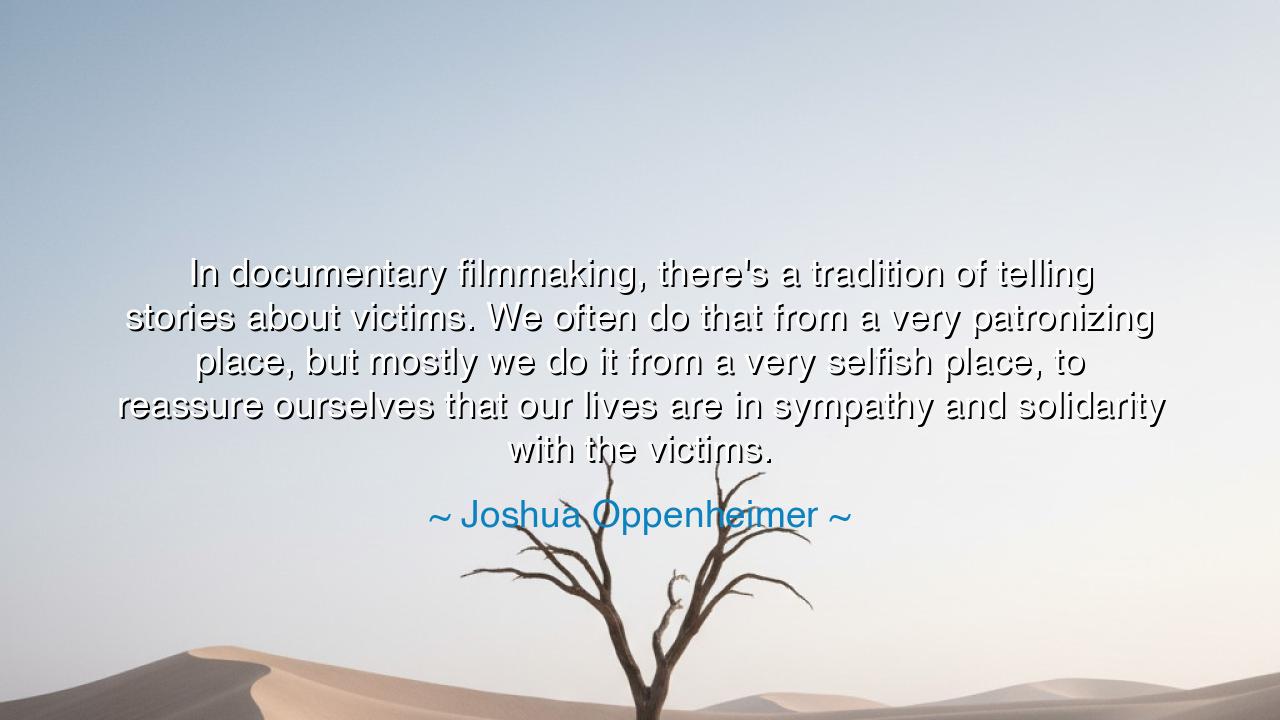
In documentary filmmaking, there's a tradition of telling
In documentary filmmaking, there's a tradition of telling stories about victims. We often do that from a very patronizing place, but mostly we do it from a very selfish place, to reassure ourselves that our lives are in sympathy and solidarity with the victims.






Hear, O seekers of truth, the words of Joshua Oppenheimer, a weaver of harrowing visions, who unveiled a mirror not only to the world but to the hearts of those who claim to tell its stories. He declared: “In documentary filmmaking, there’s a tradition of telling stories about victims. We often do that from a very patronizing place, but mostly we do it from a very selfish place, to reassure ourselves that our lives are in sympathy and solidarity with the victims.” In this confession lies a fire, a piercing challenge to all who speak of suffering: do you tell the story for the wounded, or do you tell it for yourself?
For the art of the documentary is sacred. It is the act of holding a lantern to human pain, of unveiling injustice, of amplifying the voices that power would silence. Yet Oppenheimer warns us of a great danger—that storytellers may descend not into solidarity but into vanity, turning the suffering of others into their own moral theater. In such moments, the victims become shadows, while the filmmaker becomes the hero. This is the poison of patronizing sympathy, a counterfeit of true compassion.
History, too, reveals this pattern. Recall the age of colonial exploration, when painters, writers, and even early photographers portrayed the colonized as helpless, childlike, and dependent. These images claimed to offer solidarity, yet in truth they reassured the conqueror of his superiority. The victims’ stories were framed not to empower them, but to flatter the conscience of those who told them. Thus, art became a mirror for the privileged, not a voice for the oppressed. Oppenheimer’s warning springs from this same lineage.
And yet, there are shining counterexamples. Consider the work of Jacob Riis, who in the late 19th century photographed the lives of New York’s poor. Though his work, too, has been debated, it carried a raw honesty that forced the wealthy to see what they had long ignored. His photographs were not polished to soothe the conscience, but to shock it awake. True solidarity is not comfortable—it unsettles, it disturbs, it demands action. In this spirit lies the higher calling of documentary art.
The deeper meaning of Oppenheimer’s words is this: true sympathy cannot be about us. It cannot be a garment we wear to feel righteous or kind. It must be a discipline, a humbling, a surrender of the self so that the victim’s voice, not our own, may resound. Anything less risks exploiting pain for performance. To be in solidarity is to risk discomfort, to risk the collapse of our illusions, and to place the dignity of others before the reassurance of our own moral purity.
The lesson, O listener, is stern but necessary: when you tell stories—whether through art, through speech, or through action—ask yourself who is truly being served. Do you amplify the oppressed, or do you use them as stage props for your own virtue? True solidarity demands not comfort but sacrifice. It is not the warm glow of feeling sympathetic, but the harder work of changing systems, of giving space, of handing over the microphone so that others may speak.
Therefore, let Oppenheimer’s words be a guide: beware the selfishness hidden in sympathy. In your life, seek not only to feel for others, but to stand with them in ways that cost you something—time, resources, privilege, pride. Let your acts of solidarity be measured not by how they soothe you, but by how they uplift those you claim to serve.
For in the end, the truest stories are not the ones where the storyteller shines, but where the oppressed are revealed in their full humanity, dignity, and strength. And when you walk this path, you will no longer need to reassure yourself—you will know that you stand in genuine sympathy and solidarity, side by side with those who once had no voice. This is the path of truth, and this is the charge Oppenheimer leaves for generations to come.






AAdministratorAdministrator
Welcome, honored guests. Please leave a comment, we will respond soon